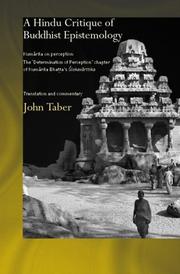| Listing 1 - 3 of 3 |
Sort by
|
Book
ISBN: 9783700171294 3700171293 Year: 2012 Volume: 831 74 Publisher: Wien : Verl. der Österr. Akad. der Wiss.,
Abstract | Keywords | Export | Availability | Bookmark
 Loading...
Loading...Choose an application
- Reference Manager
- EndNote
- RefWorks (Direct export to RefWorks)
The present volume provides an annotated English translation of the last section of Dharmak¤rti's Pram¤¤av¤rttikasvav¤tti (PVSV 164,24-176,16, ad stanzas 1.312-340), which includes his final assault on the M¤m¤¤s¤ doctrine of the author lessness (apauru¤eyatva) of the Veda. Dharmak¤rti draws out the apparently fatal consequences of this doctrine: If the Vedic scriptures are without an author, hence without an underlying intention, they can only be meaningless. Even if they have a meaning, it must be supersensible. But then, claiming that the leading M¤m¤¤saka authorities - Jaimini, ¤abara - possessed privileged cognitive access to its supersensible meaning is not an option, since the M¤m¤¤saka denies that humans have any supernatural form of knowledge. In short, Dharmak¤rti forces his opponent to admit that the Veda is nothing but a mutus liber, a "mute book." Besides questioning the very possibility of Vedic hermeneutics under M¤m¤¤saka presuppositions, the passage translated contains interesting allusions to Dharmak¤rti's linguistic theory, his views on scriptural authority, his critique of the Veda's reliability, and his understanding of the transmission of the Veda and Vedic ¤¤kh¤s ("schools", "recensions"). The section includes Dharmak¤rti's polemics against a mysterious v¤ddham¤m¤¤saka ("ancient M¤m¤¤saka"). An introduction (pp. 7-21: "The Place of PVSV 164,24-176,16 in the work of Dharmak¤rti," by V. Eltschinger), a synopsis of contents (pp. 23-30) and two independent essays round off the volume. H. Krasser's "Logic in a Religious Context: Dharmak¤rti in Defence of ¤gama" (pp. 83-118) sheds new light on Dharmak¤rti's conception of scriptural authority and its indebtedness to Dign¤ga. J. Taber's "Dharmak¤rti and the M¤m¤¤sakas in Conflict" (pp. 119-149) explores the guiding principles of the M¤m¤¤s¤ system of exegesis and assesses the relevance of Dharmak¤rti's arguments against it. A general bibliography and various indices complete the volume.
Mimamsa --- Dharmakīrti, --- Vedas --- Authorship --- Hermeneutik --- Dharmakīrti --- Dharmakīrti --- Mimamsa - Early works to 1800 --- Dharmakīrti, - 7th cent. - Pramāṇavārttikasvavṛtti. - 164,24-176,16 --- Hermeneutik. --- Mimamsa.

ISBN: 9780415648318 0415336023 Year: 2012 Publisher: London : RoutledgeCurzon,
Abstract | Keywords | Export | Availability | Bookmark
 Loading...
Loading...Choose an application
- Reference Manager
- EndNote
- RefWorks (Direct export to RefWorks)
Mimamsa --- Perception (Philosophy) --- Knowledge, Theory of (Hinduism) --- Knowledge, Theory of (Buddhism) --- Kumārila Bhaṭṭa.
Book
ISBN: 1283551039 9786613863485 9004230246 9789004230248 9789004222601 900422260X Year: 2012 Publisher: Leiden ; Boston : Brill,
Abstract | Keywords | Export | Availability | Bookmark
 Loading...
Loading...Choose an application
- Reference Manager
- EndNote
- RefWorks (Direct export to RefWorks)
The book is an introduction to key concepts of Indian Philosophy, seen from the perspective of one of its most influential schools, the Prābhākara Mīmāṃsā, which flourished from the 7th until the 20th c. AD. The book includes the critical edition and translation of Rāmānujācārya's Śāstraprameyapariccheda, which is part of his Tantrarahasya (written in South India, after the 14th c.). This text has never been translated before and it is one of the clearest elaboration of the Prābhākara thought. The book particularly aims at presenting the linguistic, deontic-ethic, hermeneutic and epistemo-logical thought of the Prābhākara Mīmāṃsā. Detailed glossary and indexes make it possible to use the book as a reference-tool for Indian philosophy and linguistics.
Mimamsa. --- Hindu philosophy. --- Philosophy, Hindu --- Philosophy --- Philosophy, Indic --- Hindu philosophy --- Hinduism --- Rāmānujācārya, --- Rāmānujaācārya, --- Ramanujaacarya,
| Listing 1 - 3 of 3 |
Sort by
|

 Search
Search Feedback
Feedback About UniCat
About UniCat  Help
Help News
News